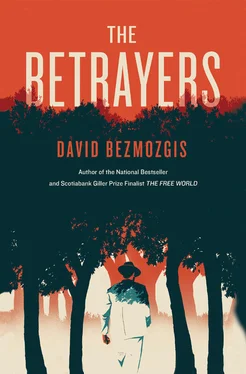— I know, Dafnaleh, Kotler said. I would have liked to call you sooner, but it wasn’t possible.
He heard the rustling that implied his daughter was in motion.
— Where are you? he asked.
— Home.
More rustling. Then it stopped.
— Is your mother there?
— You didn’t call to speak to her, did you?
— No, I called to speak to you.
— Rabbi Gedalia is here. He’s with her in the other room. They know I’m talking to you.
— How is she?
— How do you think? You hurt her, Papa. She didn’t deserve it.
— You’re right. She didn’t.
— But you did it anyway.
— Dafna, those are two separate things. The first is not something for a father and daughter to discuss. As for the second, you will have to believe me that I had no choice.
— I don’t want to talk with you about sex either, but I’m not a child and I’m not naïve. And don’t forget, we live in Jerusalem, the most sex-crazed place in the world, where half the people wear wool sacks to keep from having sex with everyone else. So you didn’t wear a wool sack and you surrendered to your desires.
Your desires. The words spoken boldly and neutrally, as if to rise above her disgust at the squalidness of her father’s passions.
— I won’t even say her name. It makes me sick to think of all the times she was in our house pretending to be loyal and respectful. Pretending to be my friend. She should have had some shame. But it doesn’t matter now, does it?
— What do you want me to say, Dafna?
— Are you planning to marry her?
— I don’t know my plans. Not about that, not about other things.
— I don’t understand. If you don’t even know your plans, why did you allow this entire mess to happen?
— As I said, Dafnaleh, I had no choice.
On the other end of the line, his daughter fell silent. A simmering, frustrated silence. Kotler imagined her in her room sitting cross-legged on her bed, glaring at the wall with her dark, intelligent eyes. What could be said about a father’s love for his children? You loved them entire. You loved even their anger at you. For what was this anger if not a frustration maddeningly entangled with love?
Kotler waited for Dafna to speak again. She was in her room, in the familiar space. He could imagine her, but she couldn’t have imagined him. At that moment he could hardly have imagined himself. In the distance was the bold black silhouette of the Crimean Mountains set against the moonlit sky. There was the quiet road, raked occasionally by the headlights of a passing car. There were the low-slung houses, even in the darkness, haphazard and needy, making their emotional appeal. And in front of him was the bright windowpane, offering a view of the conventional tedium of his landlords’ lives. He saw Svetlana rise from her seat and cross the room, carrying a folded newspaper in her hand. She stopped and said something over her shoulder to someone who wasn’t visible to Kotler. The Jewish husband, Kotler assumed, returned from his communal duties.
— When you say you had no choice, Dafna finally said, what are you talking about? I don’t understand. What exactly didn’t you have a choice about?
— Blackmail, Dafnaleh, Kotler said.
— Blackmail?
— I still believe in the policy that one doesn’t negotiate with terrorists.
— What did these terrorists want?
— It shouldn’t matter what they want. Whatever they want is what you cannot allow them to have.
— But what did they want?
— My silence.
— And what did they promise you for your silence?
— Their silence.
— Their silence? About you and her.
— I didn’t bother to ask.
— But that’s what it was.
— That’s what it turned out to be.
— And you didn’t understand that’s what they were threatening you with?
— I understood well enough.
— You understood and still you let them do it? Dafna nearly shouted. Didn’t you know what it would do to us?
— Yes, Dafna, I knew, but one thing has nothing to do with the other. There are matters of principle where you cannot compromise. Under any circumstances. If I’d compromised, it would have been worse. Far worse for all of us. For our country and for our family, which is part of our country.
— But who cares about the country if it destroys our family? The country doesn’t care. All you need to do is read the newspapers to see how the people in this country care about us. To hear the disgusting things they’re saying on television. Have you seen the television where you are?
— No.
— Have you called Benzion?
— Not yet.
— He won’t say a word about it, but imagine what it’s like for him now. Did you think about that? He has to face it all. The army offered him a leave. He should have taken it. I told him to take it. But he wouldn’t.
— Dafnaleh, this will pass. You have to believe me. I speak, unfortunately, from great experience.
— I know about your experience, Papa. Everybody knows. You’ve sacrificed and sacrificed for this country, but they still ridicule you. They ridicule you because of your sacrifices. So what good is it? Let somebody else sacrifice for a change. And if nobody else wants to, then who are you sacrificing for?
One sacrificed for one’s people as one sacrificed for one’s children. One did it because one felt that one knew better than they did. That one saw in them what they failed to see in themselves. One kept faith as God kept faith with the Israelites, the stubborn stiff-necked people, complaining even at the moment of their redemption, turning their backs, endlessly squabbling, quick to forget signs and wonders. One identified with them, even at their lowest, because otherwise one would be lost. He would be lost, desolate. A man needed to belong to something greater than himself.
But the call ended with Kotler having conveyed none of this.
It was late now, approaching midnight, too late, Kotler thought, to call Benzion. Besides, he still wasn’t fully accustomed to the idea that a soldier on active duty could be telephoned. On this subject, despite his having lived more than two decades in Israel, his frame of reference was seventy years out of date, rooted in childhood and his father’s stories of the eastern front. These stories, supported by a few photographs and a packet of yellowed field post — folded into triangles and bearing the censor’s seals — were deeply encoded in Kotler’s psyche.
A movement in the window drew his eye and Kotler turned from the black absorption of the mountains. Faster than a thought, his knees buckled, responding to an overwhelming impulse to drop to the ground, to get out of sight. Kotler caught himself, and stood rigidly, his knees still slightly and comically bent. Blood battered his heart as if to dislodge it. The fear was one he’d not known in untold years. Framed in the window was a man, Svetlana’s husband, arrested by some worry or introspection, his profile presented to Kotler. Kotler’s thoughts swirled, sense convoluted with nonsense. He knew that the man could not see him, but he feared the man could see him. He knew the year was 2013 and that the Soviet Union no longer existed, but he felt the cold menace of the KGB, sensed the nearness of his old tormentors. He knew he was an Israeli citizen, a husband and father, a dissident champion, but he felt isolated and vulnerable, helpless to stave off the horror. In the window the man blinked his eyes and wearily ran his hand through his white hair. He cleared his throat, opened his mouth to call out to his wife, squinted as he listened for her reply, and then shuffled from the room.
Leora was watching the television when Kotler entered the room. He caught a glimpse of the screen and recognized the movie, White Sun of the Desert, a Soviet film, once a personal favorite. It had come out in 1970, when he was twenty years old and taking his first tentative steps down the dissident path. He’d read a samizdat translation of Leon Uris’s Exodus. He’d given vent in mixed company to some mildly provocative ideas. Little things. The movie’s tone — dry, laconic, gently mocking of the Soviet revolutionary myths — had struck him as simpatico. And the music as well, with the famous ballad by Okudzhava, back when Kotler still considered himself a student and follower of music. Now, before Leora turned the television off, he saw the burka-clad women scurrying down the lane of the dusty Oriental town. The women in their burkas, the somnolent bearded elders, the crusading Western liberators, the primitive Muslim insurgents, the flaming oil wells; who could have predicted the immutability of this unhappy subject?
Читать дальше












